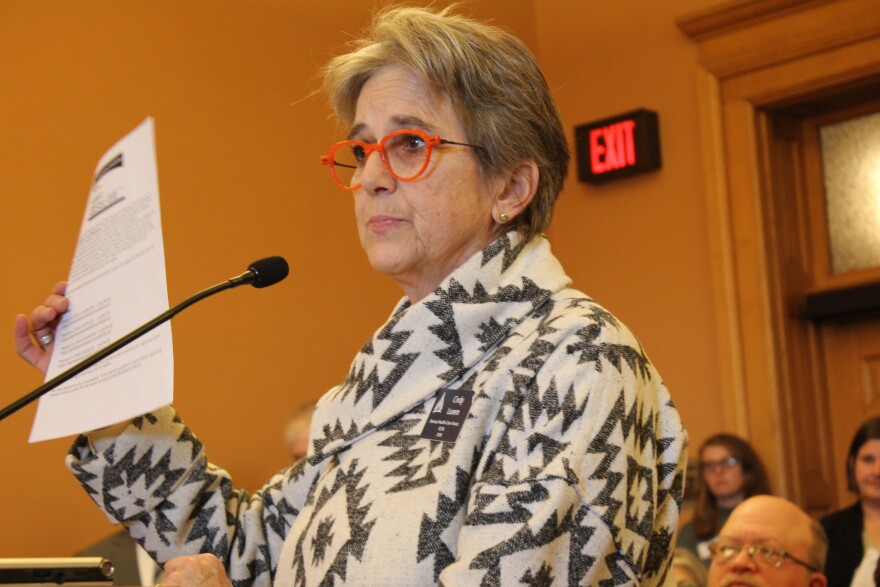Nursing homes in Kansas find themselves in crisis, say the people who run them.
Where to fix blame or how to remedy things remain matters of debate.
A parade of nursing home operators and their lobbyists pleaded with members of a Kansas House health committee Thursday to fully restore cuts in Medicaid reimbursement rates. They also called for pressure on Gov. Sam Brownback’s administration to repair a long-broken Medicaid enrollment system.
And they pleaded for lawmakers’ backing in ongoing fights with state and federal regulators over enforcement practices that dramatically increased fines in recent years.
“Maybe I’m being a little over-dramatic, but how much more do we have to put up with?” said Cindy Luxem, a lobbyist for Kansas’ for-profit nursing homes. “Shame on the state for even putting up with this crazy mess.”

Desperate for cash in 2016 to balance the state budget, Brownback cut Medicaid reimbursement rates by nearly 5 percent. Lawmakers passed a tax increase last year so that the state could reverse those and other spending cuts.
Yet a subsequent adjustment ordered by the Kansas Department for Aging and Disability Services shorted nursing homes about $55 million, according to Rachel Monger, a lobbyist for the state’s non-profit homes.
“We’re not going to stop pushing for full funding with everything we have,” Monger said.
KDADS Secretary Tim Keck said his agency recommended more funding for nursing homes than Brownback included in his proposed budget.
On top of the rate cut, a persistent backlog in processing Medicaid applications has forced nursing homes to wait months – sometimes close to a year – for payment.
Luxem blamed many of the problems on the Brownback’s privatization of Medicaid in 2013, the program known as KanCare.
“I’m going to tell you, KanCare hasn’t improved things,” Luxem said, referring to the program by name.
The industry also pointed to what it sees as heavy-handed enforcement of safety regulations for devouring money that could go to care.
Fines for serious violations jumped from $52,275 in 2012 to $4.6 million in 2016, an increase of 9,000 percent, Monger said.
“Our survey enforcement system has swung to such an extreme and it’s caused so much damage that we have been forced to start talking about it publicly,” she said.
Consider what happened in February 2016 when a confused resident walked of a facility through an unsecured door and wandered in the cold for about 20 minutes, said Scott Averill, the owner of a small nursing home in Wellsville.
The state, acting on behalf of the federal Centers for Medicare and Medicaid Services, fined the facility $36,000. Although he managed to get the penalty reduced to $12,000, Averill said such hefty fines aren’t warranted in instances when a resident suffered no real harm.
“We’re a small mom-and-pop,” he said, choking back tears. “It’s tough to write a check for those fines when your commitment is to provide great care and great quality of life.”
Mitzi McFatrich, director Kansas Advocates for Better Care, has little sympathy for an industry that she says requires vigorous regulation. She was not allowed to offer testimony at Thursday’s hearing, but said her review of the violations that resulted in the 2016 spike in fines shows that the penalties were justified.
“People were harmed,” McFatrich said. “People were sexually abused. People died. There was harm after harm after harm.”
Noting that the Trump administration has already begun a rollback of nursing home regulations, McFatrich said state officials should think twice before going any further.
“When you say you don’t want regulations, basically what you’re saying is ‘we don’t care about health standards for old people who are living in nursing facilities,’” she said.
Jim McLean is managing director of the Kansas News Service, a collaboration of KCUR, Kansas Public Radio, KMUW and High Plains Public Radio covering health, education and politics. You can reach him on Twitter @jmcleanks. Kansas News Service stories and photos may be republished at no cost with proper attribution and a link back to kcur.org.


